Tokyo, a city renowned for its vibrant culture and culinary excellence, is a must-visit destination for travelers. But beyond the iconic landmarks, lies a hidden gem for food enthusiasts, professional chefs, and anyone passionate about cooking: Kappabashi Kitchen Town, also known as Kappabashi Kitchen Tools Street. This unique district is a haven for kitchenware, offering an astounding array of tools, from the most delicate ramen bowls to robust professional-grade equipment.
If you’re seeking the heart of Tokyo’s culinary scene and a treasure trove of kitchen utensils, Kappabashi is the place to be. Let’s dive into what makes this street so special and why it deserves a spot on your Tokyo itinerary.
Discovering Kappabashi Kitchen Town
Kappabashi Street (かっぱ橋道具街), stretching over 800 meters, is home to more than 170 stores dedicated to all things kitchen-related. This isn’t just a place to buy pots and pans; it’s a comprehensive marketplace where you can find everything from exquisite Japanese knives to charming chopstick rests, realistic plastic food samples, and specialized tools for every cuisine imaginable.
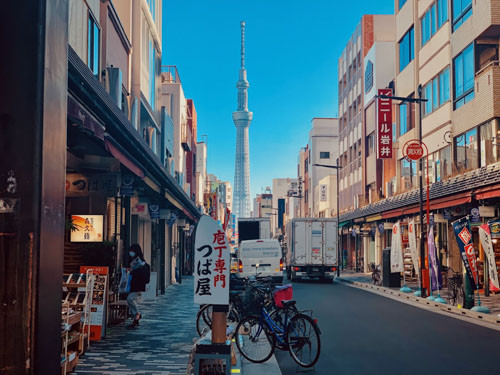 tokyo_sky_tree_near_Kappabashi
tokyo_sky_tree_near_Kappabashi
Tokyo Skytree subtly peeks over the rooftops, as seen from a quaint alleyway in Kappabashi Street.
The name “Kappabashi Kitchen Town” has intriguing origins. “Kappabashi” literally translates to “raincoat bridge.” One popular theory suggests the name comes from Kihachi Kappaya, a raincoat merchant who, in 1912 when the street was prone to flooding, funded the construction of a drainage channel. Others believe it’s derived from the sight of raincoats hung out to dry on a bridge that once crossed this channel.
Adding to the mystique, “kappa” is also the name of a mythical Japanese water creature, often depicted as mischievous and residing in rivers and ponds. This kappa has become the beloved mascot of Kappabashi Street, and you’ll encounter its charming image throughout the area.
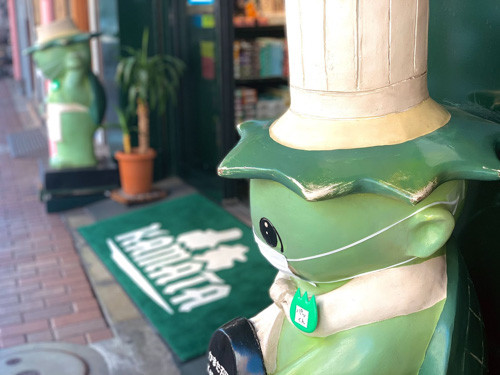 Kappabashi_mascot_in_Tokyo
Kappabashi_mascot_in_Tokyo
Even Kappabashi’s adorable kappa mascots are sporting face masks, reflecting the times.
Accessibility to Kappabashi Kitchen Tools Street is straightforward. Tawaramachi Station on the Tokyo Metro Ginza Line is the closest, just a 5-minute walk from Exit 1. Its location between the popular districts of Asakusa and Ueno also makes it easily reachable within a 10-minute walk from either Asakusa or Ueno stations.
For an enriching experience, consider combining your Kappabashi visit with a trip to Asakusa. Start your day exploring Sensoji Temple, Tokyo’s oldest temple, located in Asakusa. Wander through Nakamise-dori street for traditional souvenirs and local street food before or after your kitchenware shopping adventure.
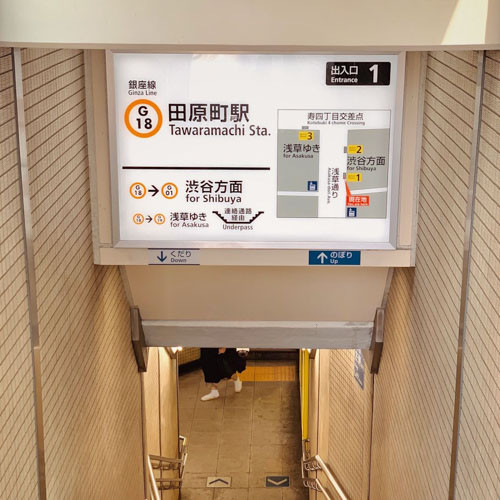 tawaramachi_station
tawaramachi_station
Tawaramachi Station, your gateway to the culinary wonders of Kappabashi.
Travel tip: If you’re navigating Tokyo with luggage, take advantage of the Kuroneko Yamato hands-free travel counter near Tawaramachi Station. For a small fee, you can store your bags, allowing for a carefree and enjoyable shopping experience.
To guide you through this captivating street, we’ve curated a selection of must-visit shops in Kappabashi, complete with a handy map to help you navigate and discover the best that Kappabashi Kitchen Tools Street has to offer.
Exploring the Best Kitchen Tool Shops in Kappabashi
Kappabashi Kitchen Town is organized into categories of kitchenware, making it easy to navigate for specific needs. Let’s explore some of the standout shops for different culinary essentials.
Japanese Knife Shops: Precision and Craftsmanship
Japanese knives are globally admired for their exceptional sharpness and durability, favored by professional chefs and home cooks alike. Crafted from various materials, from stainless steel to Hagane (the same steel used in samurai swords), these knives often boast harder blades than their Western counterparts, maintaining their edge for longer.
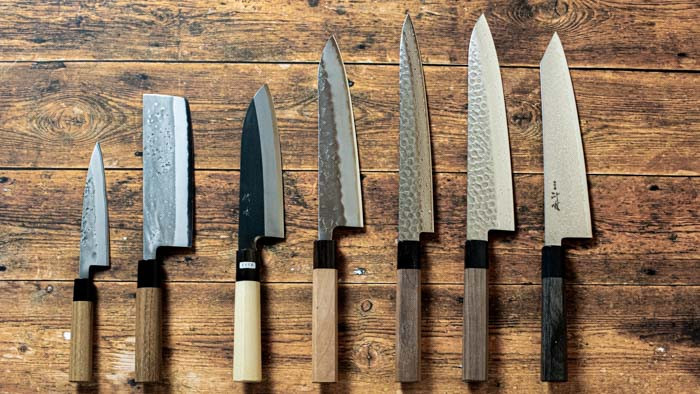 best_japanese_knives_tokyo
best_japanese_knives_tokyo
However, this hardness also means they require proper care and maintenance. Whetstones are ideal for sharpening, but sharpening rods can be a convenient alternative. Among the diverse types of Japanese knives, the Santoku knife stands out as a versatile all-purpose option for any kitchen.
Here are two exceptional knife shops in Kappabashi:
1: Kamata (かまた刃研社)
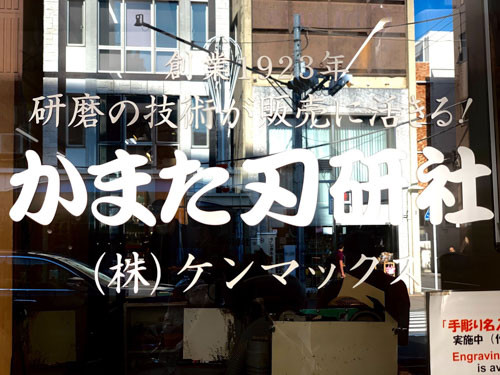 Japanese_knife_store_Kamata
Japanese_knife_store_Kamata
The welcoming storefront of Kamata, a Kappabashi institution for fine Japanese knives.
Kamata, a family-run business since 1923, is now in its third generation, led by Seiichi Kamata. This shop is a favorite among professional chefs, cooking enthusiasts, and tourists seeking top-tier Japanese knives.
While prices range from affordable to premium, depending on materials and design, Kamata guarantees exceptional quality. Consider their traditional wabocho (Japanese-style knives with wooden handles) or the versatile gyutou (chef’s knife).
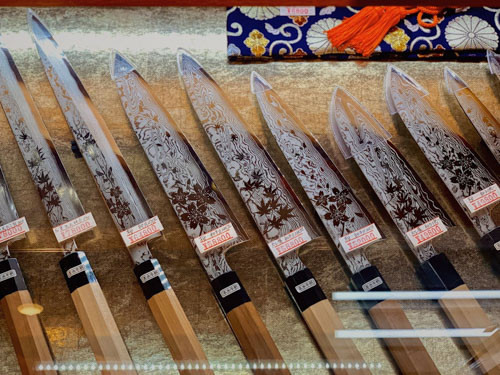 sakura_japanese_knife
sakura_japanese_knife
An exquisitely crafted Japanese knife, possibly from Kamata, showcasing the artistry and precision.
Kamata also enhances the experience by offering knife sharpening classes (previously available) and complimentary engraving (kanji or initials) on purchased knives—a perfect personal touch for a gift.
Location: Kamata on Google Maps
Credit Cards: Accepted
2: Seisuke (清助刃物)
Seisuke Knife presents a wide selection of knives from renowned Japanese craftsmen. Their mission is to share Japanese culture through high-quality knives, believing each knife to be an art piece imbued with the craftsman’s spirit. Seisuke also has a location in Portland, Oregon, demonstrating their global reach.
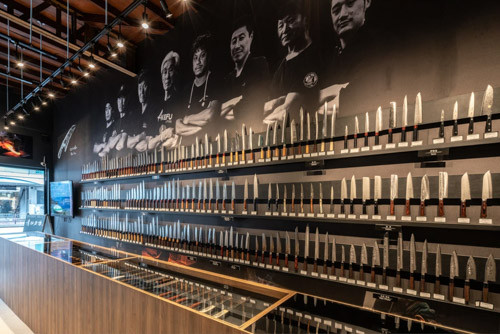 japanese_knife
japanese_knife
A close-up view of a Japanese knife at Seisuke, highlighting the blade’s sharp edge and fine craftsmanship.
Location: Seisuke Knife on Google Maps
Credit Cards: Accepted
Chopsticks Stores: Elegance at Your Fingertips
Chopsticks, originating from China, are integral to East Asian dining culture, especially in Japan. Japanese chopsticks, typically made of wood or bamboo, come in diverse sizes, shapes, and designs.
From budget-friendly to luxurious, a good pair of chopsticks is a staple in Asian households. Elevate your dining experience with chopstick rests, adding a touch of elegance to your table setting.
Here are two recommended chopstick shops in Kappabashi:
3: Hashitou (はし藤)
Established in 1910, Hashitou offers a vast array of chopsticks and related items. From beginner-friendly chopsticks for children to bulk packs of disposable chopsticks, Hashitou caters to all needs.
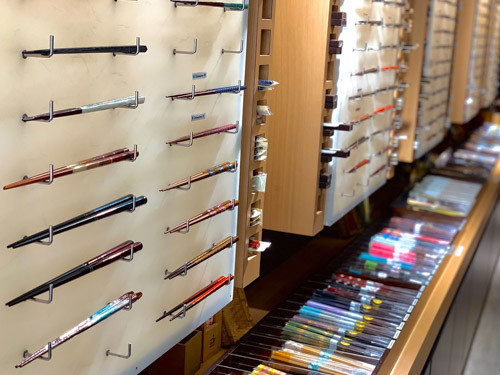 chopsticks_shop_in_Kappabashi
chopsticks_shop_in_Kappabashi
The inviting display of chopsticks at Hashitou, a Kappabashi shop with over a century of history.
Location: Hashitou on Google Maps
Credit Cards: Accepted
4: Mikura (みくら)
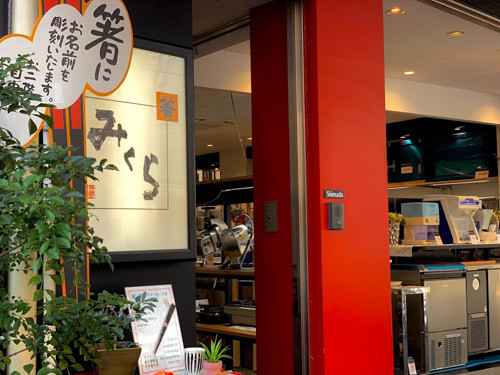 Mikura_shop_in_Kappabashi
Mikura_shop_in_Kappabashi
Mikura’s shopfront, a treasure trove of over 500 types of chopsticks, located on the second floor.
Mikura, located on the second floor (slightly less visible from the street), boasts an impressive collection of over 500 chopstick varieties. Organized by color and design, including anime-themed chopsticks, Mikura is sure to have the perfect pair for every taste.
Location: Mikura on Google Maps
Credit Cards: Not specified
Ceramics and Pottery Shops: Artistry for Your Table
Japanese ceramics and pottery are renowned for their beauty and craftsmanship. Kappabashi offers a variety of shops showcasing everything from everyday tableware to exquisite artisan pieces.
5: Soutei Yabukita (創亭やぶきた)
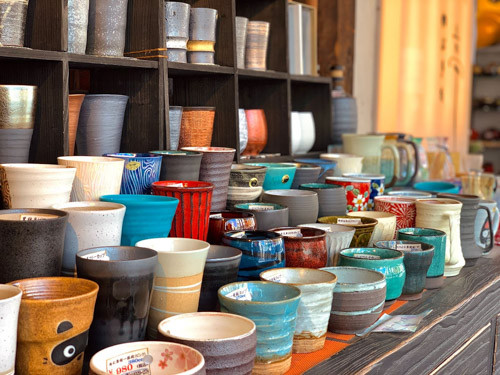 japanese_pottery_in_tokyo
japanese_pottery_in_tokyo
The vibrant and colorful pottery collection displayed at Soutei Yabukita in Kappabashi.
Yabukita’s Soutei Yabukita location features a wide and colorful pottery collection, with a strong emphasis on sakura (cherry blossom) themed ceramics and elegant flower vases. While they have another outlet, Touan Yabukita, Soutei Yabukita offers a larger selection and a must-visit second floor.
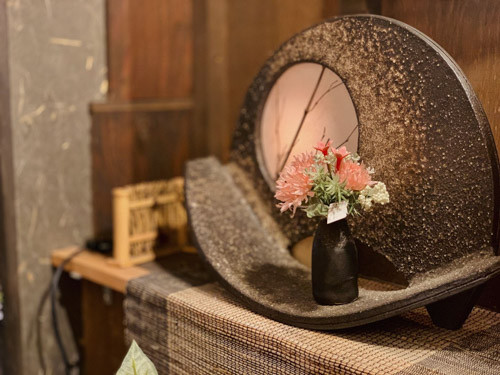 tea_ceremony_item_tokyo
tea_ceremony_item_tokyo
Traditional Japanese tea ceremony items, showcasing the delicate beauty of Japanese pottery, likely found at Yabukita.
Location: Soutei Yabukita on Google Maps
Credit Cards: Accepted
6: Yakimono Gallery Tobe Tobe (やきものギャラリー とべとべくさ)
Yakimono Gallery Tobe Tobe, tucked away in a Kappabashi alley, presents pieces from renowned artisans, resulting in a higher price range. More akin to a museum gallery, Tobe Tobe is worth visiting to admire the artistry of Japanese pottery, even if you’re not planning to purchase.
Location: Yakimono Gallery Tobe Tobe on Google Maps
Credit Cards: Not specified
7: Maeda (かっぱ橋まえ田)
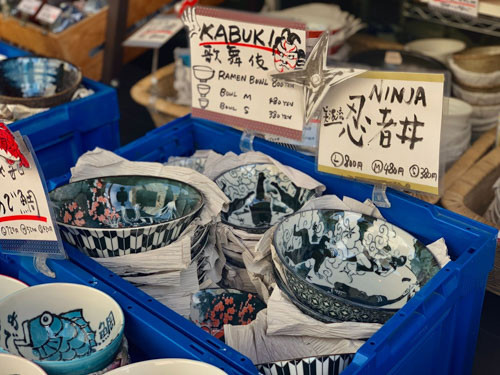 ramen_bowls_tokyo
ramen_bowls_tokyo
Stacks of ramen bowls at Maeda, a Kappabashi shop offering a wide variety of kitchenware.
Maeda is a versatile Kappabashi shop, offering ceramics, knives, chopsticks, glassware, and more. Their ramen bowls, chopstick rests, and matcha cups are highly recommended. While they stock knives, specialized knife shops may offer a more focused selection. Be prepared for narrow aisles packed with items!
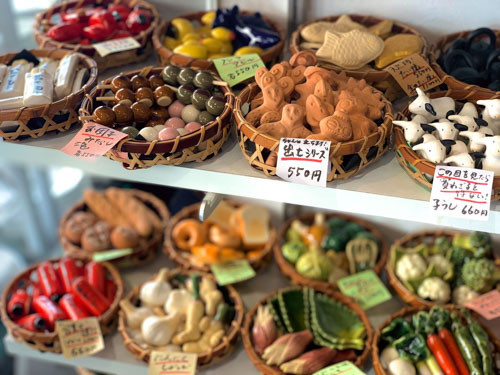 chopsticks_rest_japan
chopsticks_rest_japan
Unique and charming chopstick rests, like these at Maeda, add a touch of personality to your tableware.
Location: Maeda on Google Maps
Credit Cards: Accepted
8: Dengama
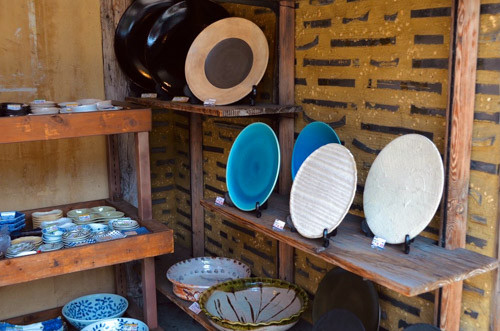 ceramic_store_kappabashi
ceramic_store_kappabashi
The two-story Dengama ceramics shop in Kappabashi, offering a wide range from everyday to artisan pieces.
Dengama, a two-story shop, showcases ceramics from across Japan. The first floor features reasonably priced daily-use items, while the second floor displays higher-quality, artisan-crafted pottery. Dengama guarantees a wide selection to suit various tastes and budgets.
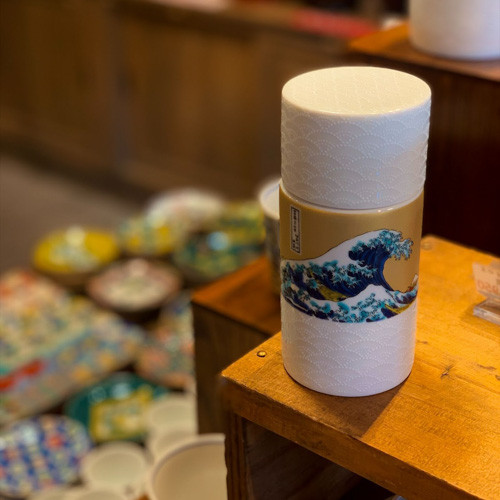 tea_container_kappabashi
tea_container_kappabashi
An elegant tea container, potentially from Dengama, exemplifying the refined craftsmanship of Japanese ceramics.
Location: Dengama on Google Maps
Credit Cards: Accepted
Fake Food Samples Shop: Whimsical and Uniquely Japanese
Japanese fake food samples, or shokuhin sanpuru, emerged in the 1920s as a way to visually represent menu items, particularly Western dishes new to Japanese cuisine. Today, these incredibly realistic replicas are still used by restaurants and have become popular souvenirs.
9: Ganso Shokuhin Sample-Ya (元祖食品サンプル屋)
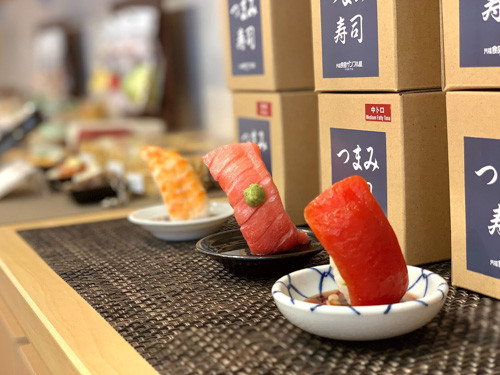 fake_sushi_magnet
fake_sushi_magnet
(A playful fake sushi magnet from Ganso Shokuhin Sample-Ya, showcasing the creativity of food sample art.)
Ganso Shokuhin Sample-Ya is the destination for fake food samples. From magnets and keychains to paperweights and DIY kits, they offer a vast range of food replica products. DIY kits allow you to create your own ramen bowls, fried rice, steak, or even beer replicas.
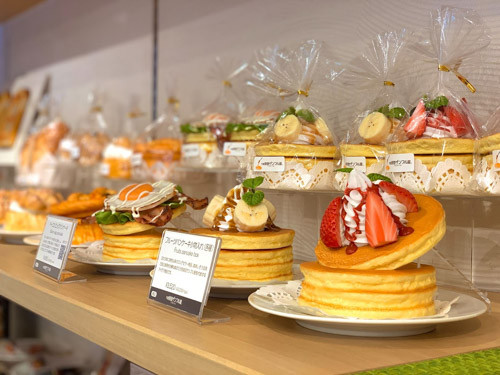 fake_food_sample
fake_food_sample
(Hyper-realistic fake food samples at Ganso Shokuhin Sample-Ya, a feast for the eyes but not for the stomach.)
Ganso Shokuhin Sample-Ya also previously offered workshops where you could learn to make your own food samples (check for current availability).
Location: Ganso Shokuhin Sample-Ya on Google Maps
Credit Cards: Accepted
Kitchen Tools for Every Need
For a comprehensive selection of kitchen tools, visit:
10: Kama-asa (釜浅商店)
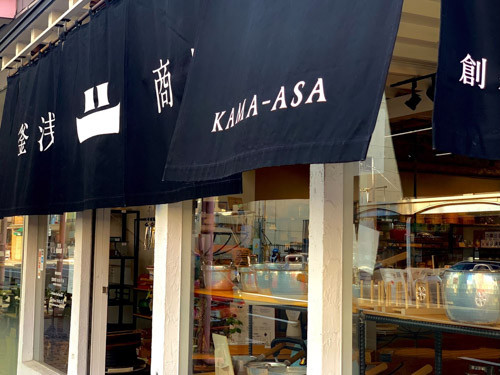 kamaasa_store_Kappabashi
kamaasa_store_Kappabashi
The classic storefront of Kama-asa, a Kappabashi institution for kitchen tools and utensils since 1908.
Kama-Asa offers a curated collection of kitchen tools, knives, pots, and utensils. They believe in tools with “universal design” developed over time for optimal functionality and food preparation. Kama-Asa personally selects items after visiting craftsmen, ensuring quality. Founded in 1908, they even opened a Paris branch in 2018.
Location: Kama-asa on Google Maps
Credit Cards: Accepted
Bonus Find: Unique Teapots and Cups
For charming teapots and cups, explore:
11: Kakesu Zakka-ten (カケス雑貨店)
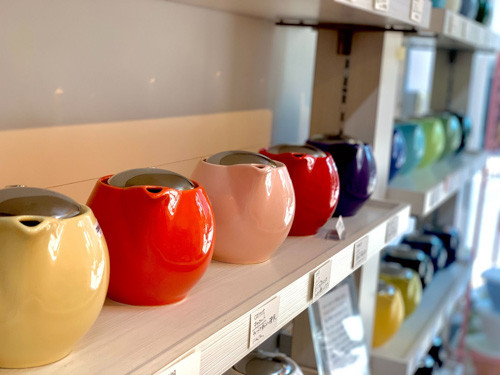 japanese_ceramic_store
japanese_ceramic_store
(A vibrant display of teapots at Kakesu Zakka-ten, offering modern and colorful Japanese ceramics.)
Kakesu Zakka-ten specializes in Japanese-made teapots, mugs, and cups with simple yet colorful modern designs. With unique items not found elsewhere, Kakesu is a worthwhile stop for tea and coffee lovers.
Location: Kakesu Zakka-ten on Google Maps
Credit Cards: Accepted
Plan Your Visit to Kappabashi Kitchen Tools Street
Kappabashi Kitchen Town is more than just a shopping destination; it’s an immersive experience into Japanese culinary culture. To make the most of your visit:
- Consider luggage storage: Utilize the Kuroneko Yamato service to explore hands-free.
- Combine with Asakusa: Explore Sensoji Temple and Nakamise-dori before or after shopping.
- Explore online options: For those unable to visit in person, Ninja Food Tours offers online Kappabashi shopping experiences and Ninja Kitchen Market provides online access to Japanese kitchenware.
Conclusion: A Culinary Treasure in Tokyo
Kappabashi Kitchen Tools Street is a unique and essential destination in Tokyo for anyone passionate about food and cooking. Whether you are a professional chef, a home cook, or simply looking for unique Japanese souvenirs, Kappabashi offers an unparalleled selection of kitchenware and culinary delights. Plan your visit and discover the treasures of Tokyo’s kitchen town!
 Kappabashi_Kitchen_Town_Map
Kappabashi_Kitchen_Town_Map
Use this map to guide your exploration of Kappabashi Kitchen Town and discover all its hidden gems.

